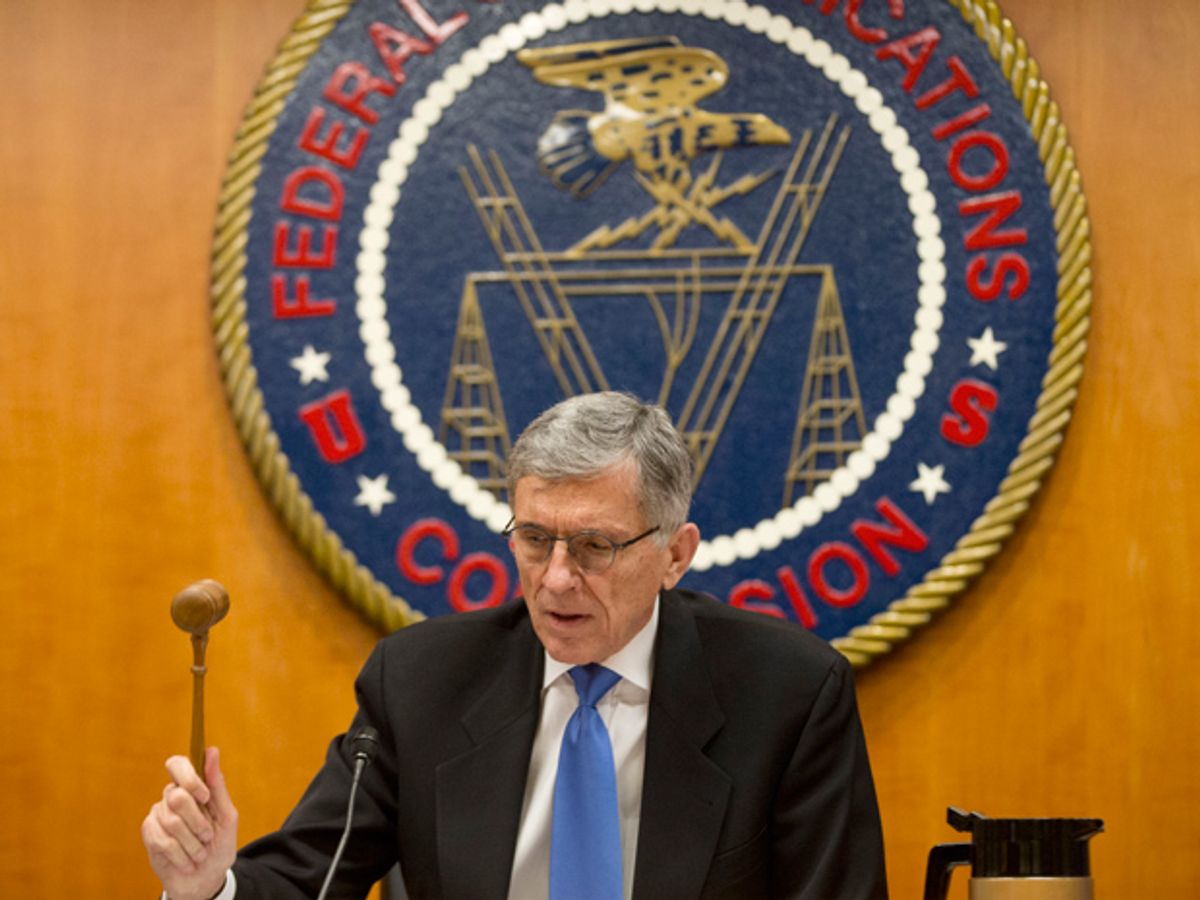Reactions to the Federal Communications Commission’s net neutrality ruling are as sharply divided as the 3-2 party-line vote at a February 26 meeting streamed live on the web. “Today the FCC has taken historic action to protect the Internet for a next generation of Americans online,” proclaimed Alan Davidson, Vice President of the nonprofit New America and Director of its Open Technology Institute. “This order imposes intrusive government regulations to solve a problem that doesn’t exist,” said Republican commissioner Ajit Pai before casting his nay vote.
The debate and the lawsuits sure to follow focus not just on the new rules themselves, but also on the FCC’s legal justification for imposing them, which invokes provisions of the 1934 Communications Act.
Three “bright line rules” are at the heart of the new regulations. They say broadband providers cannot block or throttle transmission of legal content or services, and cannot charge service providers a premium for high-speed connections. An FCC release says those practices “are known to harm the Open Internet.” Those bans were long sought by net neutrality activists, who worried that broadband carriers might limit access to competing services to maximize their profit.
Throttling became a growing concern after many users found streaming videos from companies like Netflix slowing to a crawl at busy viewing times. The causes were elusive until a Measurement Lab study identified bottlenecks at interconnections between long-haul transit networks and fixed broadband access providers including Comcast, Time Warner Cable, and Verizon. Although the carriers denied the slowdowns were intentional, and the service did improve, many customers continued to suspect the carriers—particularly those with local monopolies.
User worries when Netflix a year ago yielded to pressure to pay Comcast to assure high-speed connections to its customers. . Fixed broadband carriers saw such paid prioritization as a legitimate premium service to increase revenue. But net neutrality advocates saw it as a step toward a two-tier Internet, with the high-speed lane reserved for companies with deep pockets, and everyone else left stuck in the slow lane. Two-tier service would hurt startups, smaller companies, and micro-businesses that sell through the net, Chad Dickerson, CEO of Etsy, an online art marketplace, told the FCC meeting. “We would be forced to raise our fees or leave our sellers in the slow lane.”
The rules will allow “reasonable network management” other than paid prioritization. Full details of the 300+ page proposal are not yet available, but that presumably would allow prioritization of packets carrying time-sensitive signals such as voice telephony or interactive gaming data. Some net neutrality advocates had argued for treating all bits equally, regardless of the service they carried, but engineers had warned that could degrade time-sensitive traffic.
The new rules cover wireless broadband as well as fixed networks, reflecting the rapid growth of wireless traffic. They empower the FCC to hear and act upon complaints about interconnection issues, such as the bottlenecks found by Measurement Lab. And new transparency rules will require carriers to disclose promotional rates, fees, surcharges, and data caps, and to report packet loss as an indication of performance. Customers have complained of carriers hiding extra costs in promotions, such as not listing the price for a required cable box.
Many critics seemed more upset by the FCC’s justification of its authority than by the rules themselves. In January 2014, a federal court threw out earlier net neutrality rules the FCC had issued, saying the FCC lacked authority to regulate broadband. To claim that authority, the FCC has classified broadband services as a telecommunication service covered by Title II of the Communications Act of 1934.
“Title II is an extreme solution to an imaginary problem,” said Republican FCC commissioner Michael O’Rielly in his dissent. He claimed invoking regulations designed to cover monopoly telephone companies was a “monumental and unlawful power grab” that would let the FCC regulate broadband pricing, despite the FCC’s statement that “broadband providers shall not be subject to utility-style rate regulation”. (Wheeler made a very similar statement at the meeting, and the actual text gives a bit more detail that the story doesn’t need: “Rate regulation: the Order makes clear that broadband providers shall not be subject to utility-style rate regulation, including rate regulation, tariffs, and last-mile unbundling.”
Pai challenged the very idea of government regulation, saying the FCC was “turning its back on Internet freedom” so the government could “micromanage virtually every aspect of how the Internet works.” But when FCC chairman Tom Wheeler retorted, “The Internet is too important to allow broadband providers to be the ones making the rules,” the audience in the meeting room broke into loud applause.
Net neutrality advocates who mobilized many of the four million people who commented on the FCC proposal also cheered the vote. “Congratulations, Team Internet. We put the FCC on the right path at last,” wrote Jeremy Gillula and Mitch Stoltz of the Electronic Frontier Foundation. . Craig Aaron of Freepress called the FCC vote “the biggest victory for the public interest in the agency’s history.” Davidson of New America said the new rule “will ensure that broadband companies cannot pick winners and losers online by blocking content, prioritizing favored websites, or creating new toll lanes online.”
Praise also came from the Internet Association, a group of content and service providers including Amazon, Etsy, Google, and Netflix. CEO Michael Beckerman called the FCC vote “a welcome step in our effort to create strong, enforceable net neutrality rules that apply to both mobile and fixed broadband.”
Fixed broadband carriers appear to be gearing up for a fight. Former FCC chairman Michael Powell admitted “the overwhelming support for an open Internet,” but as head of the National Cable Telecommunications Association he complained that the FCC had used that support to “open the door to heavy-handed government regulation in a space celebrated for its free enterprise.”
Comcast executive vice president David Cohen warned the decision would produce “inevitable litigation and years of regulatory uncertainty.” AT&T filed a long legal dissent earlier in February . And in what someone must have thought was a clever idea, Verizon issued a groan-inducing press release dated “February 26, 1934” [pdf] written in an antique typewriter font calling the FCC’s reliance on Title II “a ‘Net’ loss for innovation and consumers.” (And if you think that’s bad, look at their landing page in a very poor imitation of Morse Code at.)
The broadband providers’ dismay may be affected by their conspicuous lack of success in lobbying for less regulation. Republicans, once indignant about the FCC plan, abandoned plans to write their own legislation to overturn it, the New York Times reported two days before the 26 February FCC meeting. The watchdog group Maplight.org reports that four major net neutrality opponents, AT&T, Comcast, Time Warner, and Verizon have together spent $374 million on lobbying since 2008. In contrast, three large content providers—Facebook, Netflix, and Twitter—have spent $26 million since 2009, when the first data for them is available.
Yet what the new net neutrality rules will accomplish is unclear, says Vishal Misra, a computer scientist at Columbia University. “The issue has never been freedom; none of the ISPs is trying to block Twitter feeds or blogs,” he told Spectrum. “The real problem is the lack of competition in the last mile.” And one little-noticed provision of the new rules may help with that— it would boost deployment of new broadband networks by giving them fair access to existing poles and conduits, something cable companies had complained about.
For now, the FCC is working to finalize its proposal, and doubtless a phalanx of lawyers are drafting lawsuits challenging the rules.
Jeff Hecht writes about lasers, optics, fiber optics, electronics, and communications. Trained in engineering and a life senior member of IEEE, he enjoys figuring out how laser, optical, and electronic systems work and explaining their applications and challenges. At the moment, he’s exploring the challenges of integrating lidars, cameras, and other sensing systems with artificial intelligence in self-driving cars. He has chronicled the histories of laser weapons and fiber-optic communications and written tutorial books on lasers and fiber optics.



